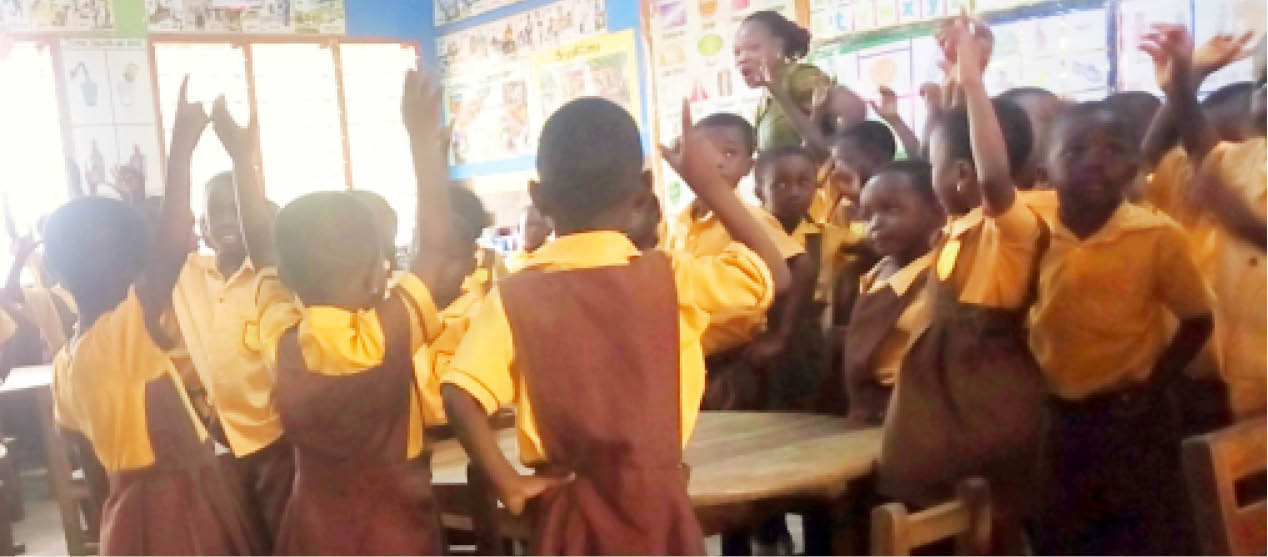ECD: In Ghana, local language is the tool for learning
Speaking vernacular, whether an indigenous language and/or Pidgin English, is generally forbidden in Nigerian schools except this during a lesson on the language. But in Ghana, local languages are the medium of teaching and learning in schools from as early as kindergarten. In Nigeria, children speaking vernacular in school, regardless whether it is one […]

In Ghana, local language is the tool for learning
Speaking vernacular, whether an indigenous language and/or Pidgin English, is generally forbidden in Nigerian schools except this during a lesson on the language. But in Ghana, local languages are the medium of teaching and learning in schools from as early as kindergarten.
In Nigeria, children speaking vernacular in school, regardless whether it is one of the indigenous languages or Pidgin English, attracts a fine or punishment. In some schools, there is a prefect assigned to this task. Back in the 90s, the fines varied from N5 to N10 or a corporal punishment.
Twenty years down the road, it is still generally forbidden to speak vernacular in schools except for cases where they are being taught and for practice during that class, when the child is required to speak it.
However, the reverse is the case in Ghana, where from the very first steps of kindergarten it is the language of communication between teachers and pupils and between pupil to pupil.
During a recent visit to Ashongman MA 1 Basic School, one of the public schools in Accra, Ghana, our reporter witnessed how teachers, during lessons for kindergarten pupils, interacted with them using the local language, Akan.
Akan was the medium to learn the alphabets, count numbers, objects, sing songs and dance as well as for interaction between pupil to pupil and between pupil to teacher and vice versa, among others.
Speaking on why the local language is such an integral tool for learning in early childhood, Headmistress of the school, Mrs. Francisca Bello, said it is part of the National Literacy Assessment Program (NALAP) in Ghana.
According to her, in most homes, the local language is the medium of communication between parents and their children and also among siblings. Since it is generally the L1 (the first language that a person is exposed to from birth), there is some level of continuity in the school of what the child has already been exposed to from birth, at home. This is in terms of words spoken, comprehension and identification of things around him or her.
While there are parents who may be fazed by the fact that learning with and using the local language at such an early stage, and this often, may adulterate the quality of English their children speak, Bello said, the method has always yielded positive results, both from the children and their parents.
Findings from a research in Uganda, published in 2017 on the challenges of local language as a medium of instruction and the way forward, said findings through interviews, focus group discussions, reviews of exercise books and lesson observations, indicated that it was easier for pupils to learn the concepts in the local language.
The study, led by Dora Akello of the Faculty of Education, Uganda Martyrs University, Uganda, said, although there are benefits of this approach, like high pupils’ enrolment, there are also inherent challenges to it.
These include poor translation, inadequate teachers’ language proficiency, lack of instructional materials, lack of administrative support and teacher-centred approach of teaching which affected pupils’ learning to read and write.
As a way of resolving such challenges, should they arise, Bello, explained that classes are not 100 percent in the local language.
She explained that, “when the children are enrolled in kindergarten one to three, we have a concept of using the local language in addition to the English Language. If the teacher has 60 minutes teaching period, he or she teaches for 40 minutes in the local language and the other 20 minutes in English. They interject with English even when using the local language.”
On whether the local language could interfere with their learning English, Mercy Kortey, the General Education Services English Coordinator, Ga East, Ghana, said, “no. When you take something like water, we tell them the name in the local language which is ‘nsuo.’ The moment you ask the child in the local language what it is, he or she can respond accurately and tell you all the things water is used for in the home. But when you teach her at the same in English, she finds it difficult. When the child responds in the local language, we do the various exercises and demonstrations.
“The teachers are versatile and can speak Ewe, Ga and Akan.”
Children in the school, when asked for the English name of an object they have previously learned in Ewe, Akan or Ga, are also able to say them and explain their uses.
In present times, there are a lot of parents who worry about their children speaking English with an accent influenced by a local language.
In 2018, there were series of reports of Abuja parents paying as much N25, 000 extra for their children to learn British accents in special schools where they could achieve this.
The demand led to ‘British Accent’ as a course of learning, being added to the curriculums of different schools. These classes were usually not part of the regular English and Literature ones. The new curriculum included lessons in ‘Phonics,’ ‘Elocution,’ ‘Enunciation’ and ‘Diction.’
However, in Ghana, Bello said parents are not perturbed about such and are very pleased that the education system begins with the children being taught using the local language.
While Ghana seems to be making progress with this teaching approach and securing its cultural values and norms in the process, with laid out plans against possible challenges, for many Nigerian schools it is more prestigious to present schools where children are taught and speak enviably, in English.
